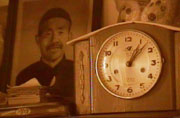Source:
01-13-2006 17:58

There are over 8 billion peasants in China. It is an enormous and often socially marginalised group. Peasants encounter employment discrimination in cities and are excluded from the social welfare system. They build houses without any state subsidies. The strict residence registration system confined them to the fields. Under such conditions, it was very lucky for Li Yunpeng to get a teacher's job in the city, but his family couldn't come with him. His different job and status split his family in two. Li Yunpeng strived his whole life to make a settled home for his family.

In the late 1960's, many young people in China were sent to villages to be re-educated by peasants. They were zhiqing, the educated urban youth. The practice resulted in greater government control of control China's labour forces. After a decade, when they returned to the cities, they were middle aged and facing many problems. Lv Xing was one of them. Having lost her home during the Cultural Revolution, she had to queue for welfare accommondation distributed by her work unit.

The 1980s was a decade of dramatic transition for the Chinese. The government stepped up economic reform. Consequently, the residence registration system was modified. Li Yunpeng and his family were reunited in the city though with no place to live. They were included in the welfare housing system and all they had to do was be patient. But people cannot wait forever, and for Lv Xing the waiting was just too long

Li Yunpeng and Lv xing were two typical examples of those who worked tirelessly all their lives to get an adequate place to live. In those years of strict central planning, inadequate housing was a common phenomenon in big cities. A sweeping reform of the housing system was about to take place in the late 1990's. The reforms saw a series of new approaches to housing management being introduced and urban accommodation becoming accessible even to those who did not belong to a work unit.
Editor:Wang Ping
